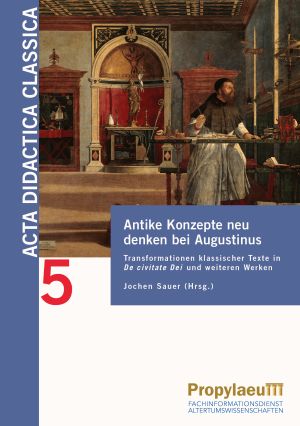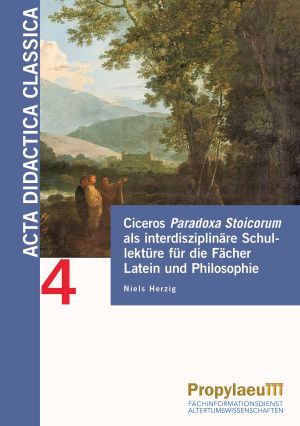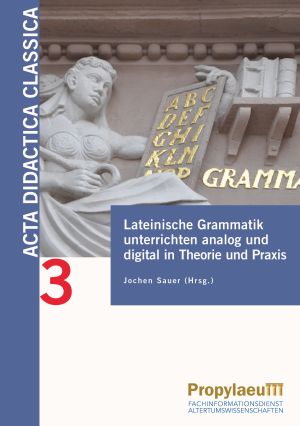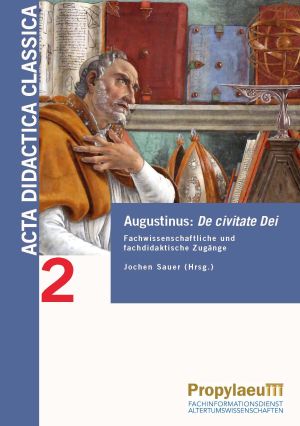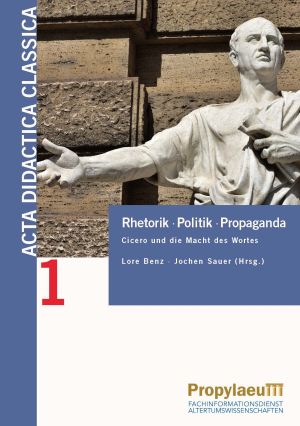Acta Didactica
Bielefelder Beiträge zur Didaktik der Alten Sprachen in Schule und Universität
Bielefelder Beiträge zur Didaktik der Alten Sprachen in Schule und Universität
The series ‚Acta Didactica Classica. Bielefelder Beiträge zur Didaktik der Alten Sprachen in Schule und Universität‘ is placed at the intersection of the academic discourse and the teaching methodology of the classical languages Latin and Greek. The series aims at having the academic and the teaching community of Classics and its related disciplines enter into a fruitful dialog. Primarily articles are published from conferences that deal with topics relevant to school and that are hosted by experts from school and the academic community.
Bielefelder Beiträge zur Didaktik der Alten Sprachen in Schule und Universität
The series ‚Acta Didactica Classica. Bielefelder Beiträge zur Didaktik der Alten Sprachen in Schule und Universität‘ is placed at the intersection of the academic discourse and the teaching methodology of the classical languages Latin and Greek. The series aims at having the academic and the teaching community of Classics and its related disciplines enter into a fruitful dialog. Primarily articles are published from conferences that deal with topics relevant to school and that are hosted by experts from school and the academic community.
Editors
Prof. Dr. Lore Benz
(Universität Bielefeld)
Dr. Dorit Funke
(Universität Bielefeld)
Dr. Jochen Sauer
(Universität Bielefeld)
Published so far
Demokratie- und Werteerziehung im Lateinunterricht
Ancient Rome was never a democracy, and Roman society differed fundamentally from today’s values. Yet the goals of democracy and values education can be achieved in Latin classes. This volume brings together five contributions by recognized experts in the field at the interface between academic scholarship and subject-specific didactics. It provides examples of texts and concepts suitable for achieving this goal. The examples presented include classical historiography (Livy), epistolary literature from the imperial period (Pliny the Younger), and utopian literature of the early modern period. Furthermore, an overview of the field of political education in Latin classes is provided.
Antike Konzepte neu denken bei Augustinus: Transformationen klassischer Texte in De civitate Dei und weiteren Werken
Augustine’s writings and especially De civitate Dei are difficult to understand without knowing the texts, concepts and models of his predecessors. The authors of this volume focus primarily on the pagan authors Cicero, Ovid, Livius and Seneca and take a look at five concepts and theories: the Stoic theory of emotions, the Roman theory of the state, concepts of history, Roman ethics of exempla judgment and ancient friendship thinking. In addition to the scientific approach, the volume also offers didactic material for use in the upper grades of the Gymnasium. The volume is aimed equally at teachers and students from universities and schools.
Ciceros Paradoxa Stoicorum als interdisziplinäre Schullektüre für die Fächer Latein und Philosophie: Eine Untersuchung eines fächerübergreifenden Kompetenzgewinns
Cicero's Paradoxa Stoicorum (46 B.C.) is a work that has long been forgotten in high school education. The Paradoxa aspire to popularize the scholarly language of Stoic philosophy with the help of rhetoric. This – from today's perspective – interdisciplinary character and the brevity of the work are reasons that allow students of our time an unusually open as well as easy access to Latin philosophical literature, which draws attention to the interdisciplinary value of teaching Latin in schools. This book focuses on concepts such as happiness, freedom and wealth, which are difficult to define, but – at the same time – determine everyday life. The book wants to show the benefits of the Paradoxa Stoicorum in particular as well as the benefit of teaching Latin across various disciplines in general.
Lateinische Grammatik unterrichten: analog und digital in Theorie und Praxis
The teaching of Latin grammar in the classroom claims to achieve several goals: supporting language acquisition and being sensitive to inclusion. Teaching grammar should be successful in digital settings as in face-to-face teaching. The following questions have been raised recently: What is an adequate syllabus? Which are the criteria for a reasonable selection? Choosing the suitable introductory method (inductive / deductive) is always important to consider. The articles in this volume address the challenges mentioned and show ways in which Latin grammar can be taught in an effective and motivating manner. These challenges do not only apply to face-to-face teaching, but also to remote learning.
Augustinus: De civitate Dei: Fachwissenschaftliche und fachdidaktische Zugänge
The work De civitate Dei by the philosopher of religion and church father Augustine of Hippo, written 413-426, links political theory, theory of society, individual ethics and theology of history in a multilayered way. Ancient philosophy is rethought from a Christian perspective. The five contributors to this collection take up the challenge to provide access to this sophisticated work and to show ways how school students especially as well as university students can be introduced to Augustine's political theory and philosophy of religion.
Rhetorik, Politik, Propaganda: Cicero und die Macht des Wortes
The five articles in this volume present Cicero's oratorial work and show ways in which Cicero and his rhetorics can be introduced to the world of pupils. All contributions are based on three speeches or speech corpora of Cicero that are central to school lessons: the speeches against Catiline, the speech for Sestius and the Philippine speeches. A detailed bibliography with reviews of relevant didactic publications concludes the contributions. A comprehensive appendix offers material for implementation in the classroom.




